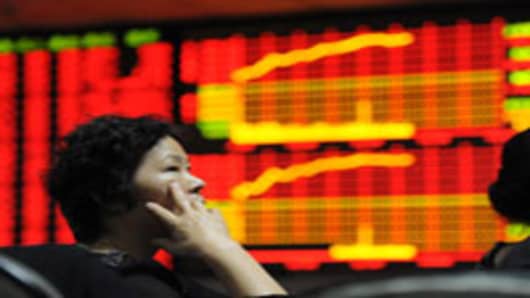China’s economy grew at its slowest pace in three years in the second quarter of the year, but some experts say fears over China’s growth are overblown and investors are underestimating the value of Chinese equities and currency.
According to Dariusz Kowalczyk, Senior Economist and Strategist for Asia ex. Japan at French bank Credit Agricole, Chinese policymakers will make sure that the economy rebounds in the second-half.
“Due to misperceptions and an underestimation of Beijing’s capabilities, the market is not pricing in China’s favorable growth outlook,” Kowalczyk said in a report published Friday. “The Chinese equity market seems undervalued, and should rebound in [the second half] as growth improves. The yuan is trading relatively cheap in the spot market, and even more so in the [over-the-counter] market.”
Chinese stocks are currently trading at 9.6 times forward 2012 earnings, compared with an average of 17.5 times since 2006, according to data from the Shanghai Stock Exchange. The benchmark Shanghai Composite Index has fallen 13 percent from the year’s high on March 2, while the yuan is trading at a nine-month low of 6.3853 to the U.S. dollar.
Nomura economist Zhiwei Zhang also believes the economy will pick up momentum in the third quarter which will help boost equities. “We are bullish about the (equities) market,” Zhang said, adding that valuations are looking cheap and investors are pricing in too bearish an outlook for China’s economy in the second-half.
Investors will be looking for more hints on China’s economic health on Tuesday, when HSBC releases its flash Purchasing Managers’ Index for July, a gauge of sentiment among small and medium enterprises in the manufacturing sector.
The final reading of the June survey showed China's factory activity shrank at the fastest pace in seven months as new export orders tumbled to lows last seen in March 2009, underlying weakness in the export engine of the Chinese economy.
If data continue to be weak, more stimulus measures such as a cut in banks’ reserve requirement ratios will likely come in the next month or two, say market observers.
These new easing measures, which will translate into lower borrowing costs in China, have not been priced in by markets, Credit Agricole’s Kowalczyk said. This will help ensure that China “not only meets but also beats its 7.5 percent growth target for 2012,” he said in the report.
— By CNBC’s Jean Chua.


